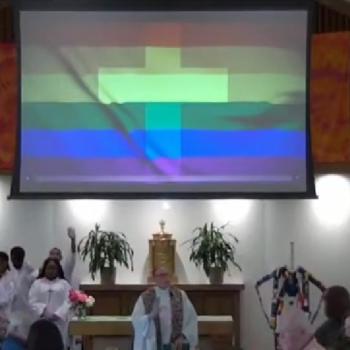First, I want to thank Eric for agreeing to this written dialogue. I also hope my readers appreciate the time and effort such a dialogue takes and thank Eric, too.
The differences in the concept of authority in the Christian’s life stands at the center of the Protestant/Catholic debate. Below, I address the key points Eric made in his opening statement. I show that he made some major assumptions that an appeal to Scripture alone fails to answer, like interpretive disagreements. Furthermore, in his appeal to the Holy Spirit’s role in an interpreter’s understanding (or failure to understand) of Scripture, Eric makes a moral judgment on all those with whom he disagrees. He contends that Scripture is clear to all those who truly “hear it.” Any disagreement or confusion comes from a person’s hardness of heart and unwillingness to listen to the Holy Spirit.
We Agree on the Material Sufficiency of Scripture
This brings us back to the two earlier questions: How do we know when an authority, like the church, is disobeying God, and what do we do when that happens? The answer is that God’s word contains within itself all that is necessary for the Christian life.
Similarly, the words of God bear authority because of what they are. They do not require some additional stamp of approval in order for them to be granted or given authority. Rather, their authority ought to be recognized as authoritative because of their very nature.
What Eric describes above is commonly referred to as the material sufficiency of Scripture. Here, both Catholics and Protestants agree. As Sean Patrick at Call to Communion states:
For scripture to be materially sufficient, it would have to contain (explicitly or implicitly) all that is needed for salvation.
The Catholic Church (here I mean the historic visible Church established by Christ) has always maintained this view of Scripture. For example, we see this in the writings of fathers like St. Vincent of Lerins.
Since the canon of Scripture is complete, and is in itself abundantly sufficient…
We Disagree on Formal Sufficiency
We disagree on who gets to interpret Scripture, or what is commonly known as the formal sufficiency of Scripture. Does Scripture possess within itself enough clarity to exist without the need for external interpretive authority? Again, historically, the Church says no, as St. Vincent continues:
…what need is there to join to it the interpretation of the Church? The answer is that because of the very depth of Scripture all men do not place one identical interpretation upon it. The statements of the same writer are explained by different men in different ways, so much so that it seems almost possible to extract from it as many opinions as there are men.
He then lists all the major heretics before his time that twisted Scripture to their own destruction. (2 Peter 3:16) He concludes:
Therefore, because of the intricacies of error, which is so multiform, there is great need for the laying down of a rule for the exposition of Prophets and Apostles in accordance with the standard of the interpretation of the Church Catholic.
How Are Disagreements Resolved?
Eric agrees that an interpreter may twist Scripture:
…if someone wanted to twist the word of God, they could do so.
However, his solution offers no objective criterion to determine if a successful interpretation occurred as opposed to a “twisting unto destruction.” Ultimately, Eric appeals to the Holy Spirit.
Appeal to the Holy Spirit?
The cause, therefore, behind disagreements over God’s word is not due to a weakness in the word, but in man. The Holy Spirit, therefore, must regenerate man’s heart and open man’s eyes so that he will stop twisting Scripture and instead submit to Scripture. God’s word has an inherent meaning and authority. The question is whether man will submit to that authority and seek to understand that meaning.
Notice that for Eric, the Holy Spirit settles disagreements by regenerating the heart and opening the mind of the interpreter. Scripture, which possesses “inherent meaning,” merely awaits the Holy Spirit to illuminate the heart and mind of the interpreter. Now, how do two “regenerated” interpreters, both with their minds “open,” resolve their disagreements? This remains unclear. Eric may assume himself regenerated and his eyes open and all who agree with his interpretation of Scripture to likewise possess regeneration and open eyes. However, such an approach solves nothing.
Those Who Disagree Do Not Belong to Christ
Moreover, what of those with whom he continues to disagree with?
Those who truly belong to Christ will, by the work of the Holy Spirit, hear his voice and follow him. This includes those who hold positions of authority within the church. And any earthly shepherd that seeks to lead the sheep ought to submit himself to the voice of that Heavenly Shepherd.
According to Eric, those who belong to Christ hear His voice and follow Him. Conversely, those who do not belong to Christ, refuse to hear His voice and refuse to follow Him, as they lack the Holy Spirit. Given the topic in question (Christian authority), I assume this applies to Scriptural interpretation, too, as according to the quote above, only those who do not belong to Christ misinterpret Scripture. If I misunderstood Eric, I stand ready for his correction.
Conclusion
As stated at the outset, Eric’s argument for the authority of Scripture rests on assumptions that an appeal to Scripture alone fails to answer. One cannot simply write off disagreements over Scriptural interpretations by declaring their opponent as unregenerated and closed-eyed to the leading of the Holy Spirit. What of two interpreters who both claim regeneration and in possession of “open eyes,” yet still disagree? I hope Eric addresses this in his next response.
Thank you!
Read The Latin Right’s other writing here.
Please visit my Facebook page and IM your questions (and follow my page) or topics for articles you would like covered.
Also, please subscribe my YouTube page for updates on upcoming articles.














